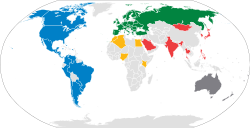| Sport | American football |
|---|---|
| First season | 1992 |
| No. of teams | 11 |
| Most recent champion(s) | |
| Most titles |
The European Junior Championship is an American football tournament contested by the national teams of European nations. It was founded in 1992 and is held every two years.
